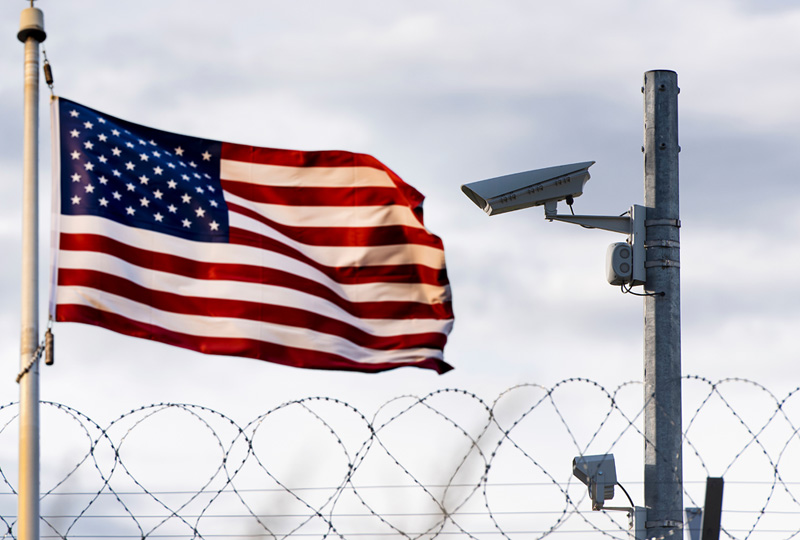Post by creature386 on Nov 15, 2024 22:32:13 GMT 5
Since we had a very lively discussion about the recent US election in the "Index to AGW Denialist Claims" thread, I thought we might give it its own topic, as obviously, the implications will reach beyond merely global warming.
2025-2028
The United States is becoming more authoritarian
Plus, Project 2025* plans to censor social media content critical of the administration; a small forum like this is exactly the kind of low-traffic place that'll fall under the radar.
(*For those who don't know, Project 2025 is a conservative political initiative widely considered to be the inofficial manifesto for the next Presidential term. Trump repeatedly denies to have read it, the Heritage Foundation employs many people closely-aligned with him and its proposals overlap with many of the promises he made during his campaign.)
Use this thread to:
A) Post news articles related to the upcoming second Trump administration.
B) Share your predictions and opinions on what impact they'll make on both the nation and worldwide.
C) Vent about whatever you need to vent about that you wouldn't like to post in a place where the federal government might be watching 

I'll start. The website futuretimeline.net, known for its somewhat sensationalist futurist predictions, wagers a detailed, yet pessimistic forecast (at least they're predicting economic hurdles to block the worst stuff):
2025-2028
The United States is becoming more authoritarian
On 6th November 2024, Donald Trump defeated the Democratic candidate Kamala Harris in the US presidential election. Trump became the first Republican nominee since 2004 to win the popular vote, and the first president to be elected to a non-consecutive second term in 132 years, when Grover Cleveland won the 1892 election.
Ezoic
Trump's campaign incited outrage with its barrage of false statements and divisive rhetoric – including claims that the 2020 election had been stolen, engaging in anti-immigrant fearmongering, and promoting conspiracy theories. Trump's embrace of far-right extremism, as well as increasingly violent, dehumanising, and authoritarian language against his political opponents, drove historians and scholars to describe his words as fascist, unlike anything a political candidate had ever said in modern U.S. history, and a continued breaking of political norms.
With control over both the executive branch and Congress, Trump's administration quickly set its sights on implementing Project 2025 – a sweeping blueprint for consolidating power within the federal government. Published by The Heritage Foundation, America's most influential conservative think tank, and co-authored by 140 former Trump staffers, Project 2025 outlines a bold vision to reshape the country's governance. The plan grants the president unprecedented control over federal agencies, reduces regulatory oversight, and strips protections across various sectors. Through this initiative, the executive branch seeks to dismantle the so-called "deep state" and replace thousands of career civil servants with loyalists, prioritising those aligned with Trump's ideological vision. Critics warn that these changes could weaken democratic institutions and erode checks and balances, letting the president operate with fewer constraints and less accountability.
One of the Trump administration's first major actions is a sweeping programme of mass deportations targeting undocumented immigrants. With promises to remove up to 10 million undocumented residents from the United States, the administration moves swiftly to expand Immigration and Customs Enforcement (ICE) operations, increase detention centre capacity, and deploy resources to accelerate deportation proceedings. The goal, officials claim, is to secure the nation's borders, reduce crime, and prioritise jobs for American citizens.
In addition to the mass deportations, Project 2025 includes proposals to denaturalise certain immigrants – a process that revokes the U.S. citizenship from naturalised immigrants deemed "problematic" or "disloyal" – thus rendering them deportable. Although historically a rare practice and highly controversial, denaturalisation enters mainstream policy discussions during this time, with potential targets including individuals from certain countries, those with specific political affiliations, or those found to be overly critical of the administration.

However, the scale of this deportation effort is hampered by formidable challenges, with projected costs running into the hundreds of billions, alongside a number of legal, logistical, and operational issues.* Industries such as agriculture, construction, and hospitality – which rely heavily on immigrant labour – face the potential for major workforce shortages and supply chain disruptions, triggering a backlash from business leaders. Legislative progress also stalls, as even some conservative lawmakers express concerns over the programme's economic and social implications. Civil rights organisations file a series of legal challenges, complicating and delaying the rollout, with courts ruling in some cases that specific aspects of the programme violate the constitution.
Despite these hurdles, Project 2025's centralised structure allows the administration to push forward elements of the initiative by bypassing certain safeguards and circumventing state-level protections. Together with ongoing issues over the Mexico border wall, started during Trump's first presidency, these deportations become highly contentious and polarising. Increasingly frequent reports emerge of human rights abuses, particularly at detention centres, such as overcrowding, poor sanitation, and lack of care.
In addition to immigration reform, Project 2025 includes a series of measures aimed at expanding federal surveillance and tightening control over civil liberties. Under the guise of "national security," Trump's administration proposes enhanced monitoring tools for tracking suspected threats – targeting political opponents, activists, and minority communities. The programme extends to online spaces, where authorities implement intensified monitoring of social media platforms, forums, and independent news websites to detect and flag "subversive" content. These expanded surveillance capabilities raise concerns about the potential targeting of individuals who openly criticise the administration or express dissenting views.
New policies also seek to curtail press freedom with stricter regulations on media outlets deemed "unpatriotic" or "biased." As part of this effort, the Trump administration moves to defund public broadcasting entities like NPR and PBS. Journalists critical of the administration face heightened scrutiny, with some even threatened with legal action.
Meanwhile, Project 2025 empowers federal law enforcement with broader authority to suppress protests, even going as far as deploying the military to break up such gatherings. This marks a significant departure from American norms, which historically upheld free assembly and civil disobedience as protected rights, drawing comparisons to hardline regimes like China and Russia.
Adding to concerns over civil liberties, Project 2025 mandates that states provide abortion data, ending what had previously been a voluntary reporting system.* States must now report on the number of abortions performed, gestational age at the time of the procedure, reasons for each abortion, the pregnant person's state of residence, and method used. To enforce compliance, the administration threatens to halt federal funding for states that do not supply the required data. As surveillance of pregnancy outcomes intensifies, this data is weaponised against individuals in states hostile to abortion rights, criminalising those seeking or assisting with abortions. The prospect of a nationwide abortion ban moves closer to reality, with grave implications for women's health and well-being.
Project 2025 also envisions a rollback of protections for LGBT individuals, proposing measures that remove federal recognition of gender diversity and eliminate protections against discrimination in healthcare, housing, and employment. The plan aims to reinstate narrow definitions of gender and sex, erasing policies that provide access to gender-affirming healthcare and protect individuals from discrimination based on sexual orientation or gender identity. Critics argue that this marks a dangerous regression in civil rights, targeting people in ways that parallel the restrictive laws seen in authoritarian states that enforce social conformity. The impact of these policies threatens to marginalise LGBT individuals further, eroding gains made in recent decades and enforcing a rigid, state-sanctioned ideology around gender and sexuality.
Overall, the combination of intensified surveillance, restrictions on reproductive rights, rollback of LGBT protections, expanded police and military powers, and the deportation of political dissidents creates a troubling precedent for free speech, privacy, and civil liberties, marking a shift towards a more authoritarian state.
Project 2025 includes many other proposals – affecting education, employment, the environment, welfare programs, and much more* – signalling a decisive rightward turn in policymaking. As it begins to reshape American governance, concerns grow that the 2024 election may have been the last truly free and fair presidential contest in the United States. The consolidation of executive power lays a strong foundation to influence or restrict any future democratic processes. With echoes of tactics employed by autocratic leaders such as Vladimir Putin, observers warn that democratic safeguards Americans have long taken for granted may weaken further, creating a turbulent road to the 2028 election and beyond.
Ezoic
Trump's campaign incited outrage with its barrage of false statements and divisive rhetoric – including claims that the 2020 election had been stolen, engaging in anti-immigrant fearmongering, and promoting conspiracy theories. Trump's embrace of far-right extremism, as well as increasingly violent, dehumanising, and authoritarian language against his political opponents, drove historians and scholars to describe his words as fascist, unlike anything a political candidate had ever said in modern U.S. history, and a continued breaking of political norms.
With control over both the executive branch and Congress, Trump's administration quickly set its sights on implementing Project 2025 – a sweeping blueprint for consolidating power within the federal government. Published by The Heritage Foundation, America's most influential conservative think tank, and co-authored by 140 former Trump staffers, Project 2025 outlines a bold vision to reshape the country's governance. The plan grants the president unprecedented control over federal agencies, reduces regulatory oversight, and strips protections across various sectors. Through this initiative, the executive branch seeks to dismantle the so-called "deep state" and replace thousands of career civil servants with loyalists, prioritising those aligned with Trump's ideological vision. Critics warn that these changes could weaken democratic institutions and erode checks and balances, letting the president operate with fewer constraints and less accountability.
One of the Trump administration's first major actions is a sweeping programme of mass deportations targeting undocumented immigrants. With promises to remove up to 10 million undocumented residents from the United States, the administration moves swiftly to expand Immigration and Customs Enforcement (ICE) operations, increase detention centre capacity, and deploy resources to accelerate deportation proceedings. The goal, officials claim, is to secure the nation's borders, reduce crime, and prioritise jobs for American citizens.
In addition to the mass deportations, Project 2025 includes proposals to denaturalise certain immigrants – a process that revokes the U.S. citizenship from naturalised immigrants deemed "problematic" or "disloyal" – thus rendering them deportable. Although historically a rare practice and highly controversial, denaturalisation enters mainstream policy discussions during this time, with potential targets including individuals from certain countries, those with specific political affiliations, or those found to be overly critical of the administration.

However, the scale of this deportation effort is hampered by formidable challenges, with projected costs running into the hundreds of billions, alongside a number of legal, logistical, and operational issues.* Industries such as agriculture, construction, and hospitality – which rely heavily on immigrant labour – face the potential for major workforce shortages and supply chain disruptions, triggering a backlash from business leaders. Legislative progress also stalls, as even some conservative lawmakers express concerns over the programme's economic and social implications. Civil rights organisations file a series of legal challenges, complicating and delaying the rollout, with courts ruling in some cases that specific aspects of the programme violate the constitution.
Despite these hurdles, Project 2025's centralised structure allows the administration to push forward elements of the initiative by bypassing certain safeguards and circumventing state-level protections. Together with ongoing issues over the Mexico border wall, started during Trump's first presidency, these deportations become highly contentious and polarising. Increasingly frequent reports emerge of human rights abuses, particularly at detention centres, such as overcrowding, poor sanitation, and lack of care.
In addition to immigration reform, Project 2025 includes a series of measures aimed at expanding federal surveillance and tightening control over civil liberties. Under the guise of "national security," Trump's administration proposes enhanced monitoring tools for tracking suspected threats – targeting political opponents, activists, and minority communities. The programme extends to online spaces, where authorities implement intensified monitoring of social media platforms, forums, and independent news websites to detect and flag "subversive" content. These expanded surveillance capabilities raise concerns about the potential targeting of individuals who openly criticise the administration or express dissenting views.
New policies also seek to curtail press freedom with stricter regulations on media outlets deemed "unpatriotic" or "biased." As part of this effort, the Trump administration moves to defund public broadcasting entities like NPR and PBS. Journalists critical of the administration face heightened scrutiny, with some even threatened with legal action.
Meanwhile, Project 2025 empowers federal law enforcement with broader authority to suppress protests, even going as far as deploying the military to break up such gatherings. This marks a significant departure from American norms, which historically upheld free assembly and civil disobedience as protected rights, drawing comparisons to hardline regimes like China and Russia.
Adding to concerns over civil liberties, Project 2025 mandates that states provide abortion data, ending what had previously been a voluntary reporting system.* States must now report on the number of abortions performed, gestational age at the time of the procedure, reasons for each abortion, the pregnant person's state of residence, and method used. To enforce compliance, the administration threatens to halt federal funding for states that do not supply the required data. As surveillance of pregnancy outcomes intensifies, this data is weaponised against individuals in states hostile to abortion rights, criminalising those seeking or assisting with abortions. The prospect of a nationwide abortion ban moves closer to reality, with grave implications for women's health and well-being.
Project 2025 also envisions a rollback of protections for LGBT individuals, proposing measures that remove federal recognition of gender diversity and eliminate protections against discrimination in healthcare, housing, and employment. The plan aims to reinstate narrow definitions of gender and sex, erasing policies that provide access to gender-affirming healthcare and protect individuals from discrimination based on sexual orientation or gender identity. Critics argue that this marks a dangerous regression in civil rights, targeting people in ways that parallel the restrictive laws seen in authoritarian states that enforce social conformity. The impact of these policies threatens to marginalise LGBT individuals further, eroding gains made in recent decades and enforcing a rigid, state-sanctioned ideology around gender and sexuality.
Overall, the combination of intensified surveillance, restrictions on reproductive rights, rollback of LGBT protections, expanded police and military powers, and the deportation of political dissidents creates a troubling precedent for free speech, privacy, and civil liberties, marking a shift towards a more authoritarian state.
Project 2025 includes many other proposals – affecting education, employment, the environment, welfare programs, and much more* – signalling a decisive rightward turn in policymaking. As it begins to reshape American governance, concerns grow that the 2024 election may have been the last truly free and fair presidential contest in the United States. The consolidation of executive power lays a strong foundation to influence or restrict any future democratic processes. With echoes of tactics employed by autocratic leaders such as Vladimir Putin, observers warn that democratic safeguards Americans have long taken for granted may weaken further, creating a turbulent road to the 2028 election and beyond.
(The other predictions you can read there are more optimistic, I swear.)










